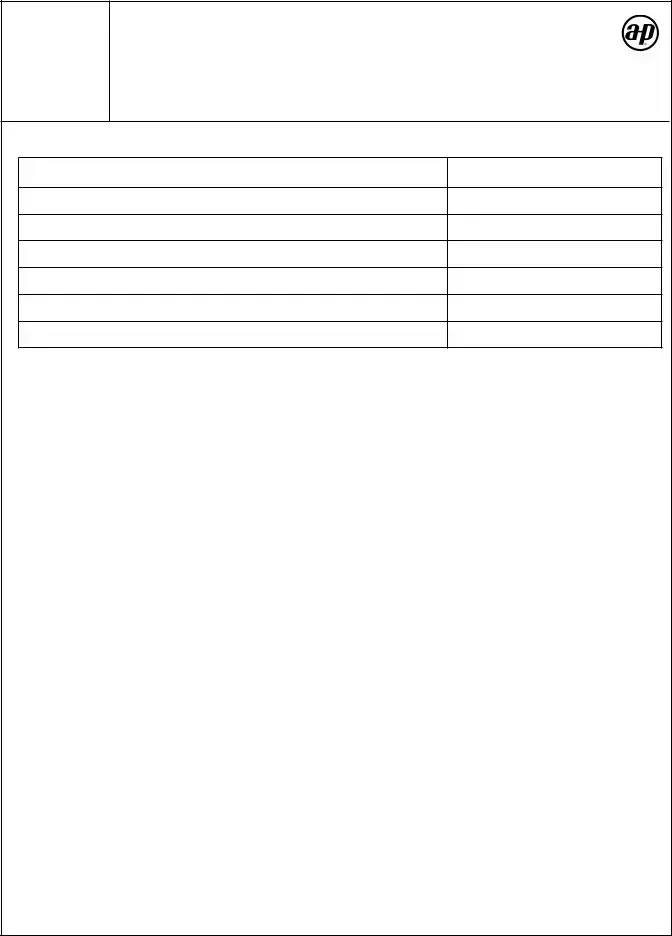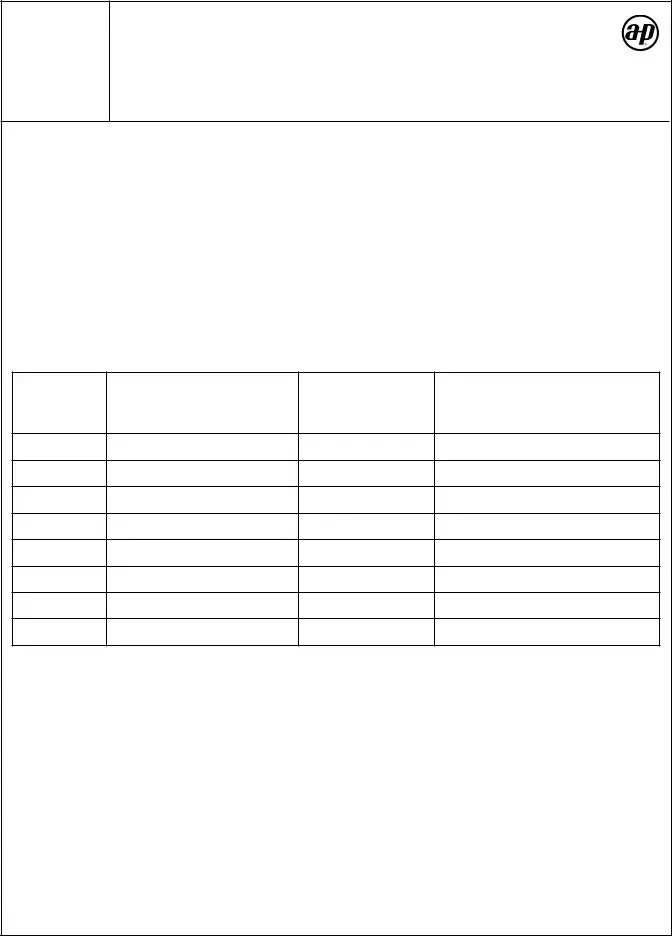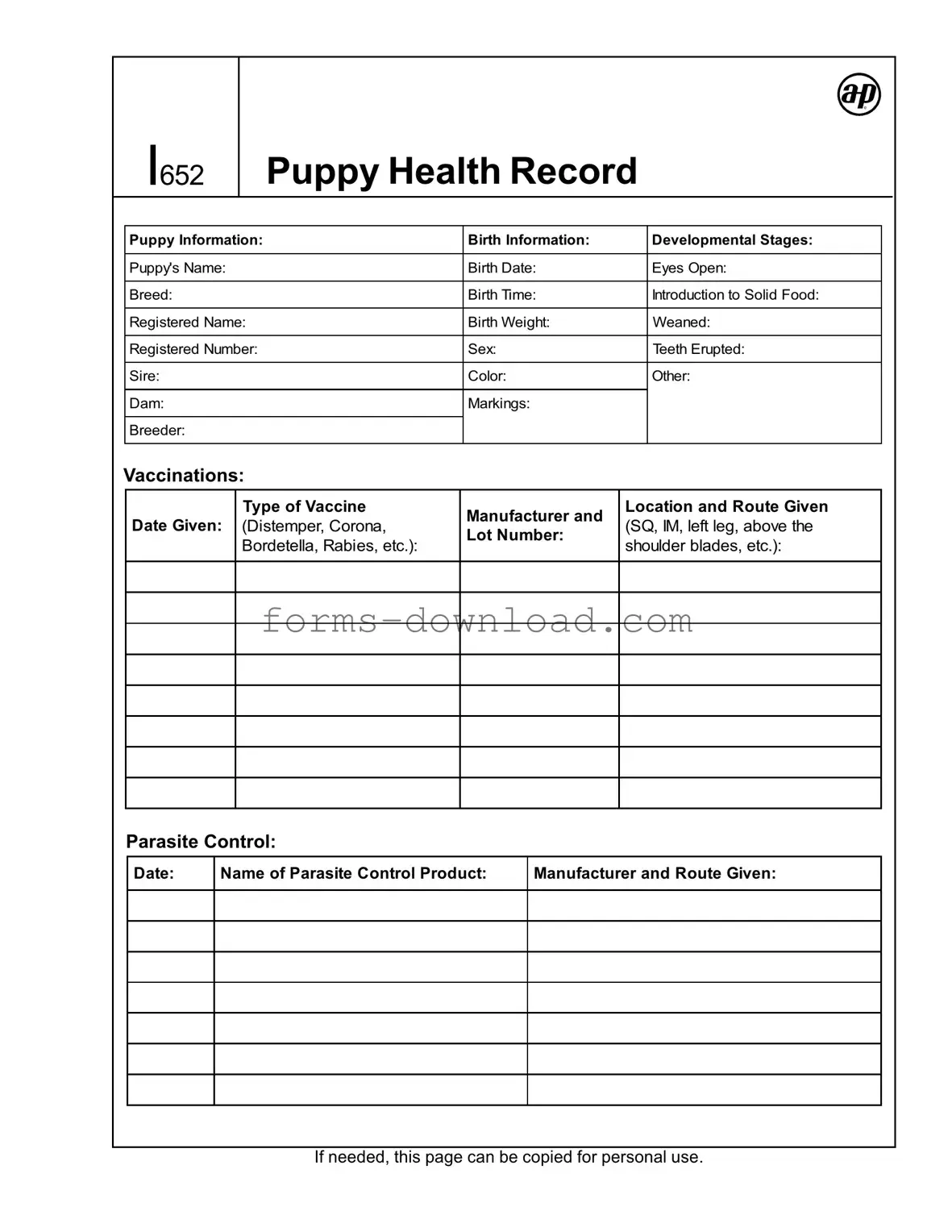Blank Puppy Health Record Form
When bringing a new puppy into your home, understanding its health needs is paramount. The Puppy Health Record form serves as a comprehensive tool to track vital information about your puppy’s early life and health milestones. This form includes essential details such as the puppy's name, breed, and birth information, which help establish a foundation for its identity and lineage. As the puppy grows, various developmental stages are documented, including when its eyes open, the introduction to solid food, and the timeline for weaning. Vaccination records play a critical role, detailing the types of vaccines administered, the dates they were given, and the specific locations and methods of administration. Additionally, the form covers parasite control, ensuring that owners are aware of the products used and their respective manufacturers. Regular examinations and procedures performed by either the owner or a veterinarian are also noted, providing a clear picture of the puppy's health over time. By maintaining this record, puppy owners can ensure that their furry companions receive the best care possible during those crucial early months.
More PDF Forms
I-983 - This form outlines the training plan that students must submit as part of their application process.
Real Doctors Note for Work Pdf Free - This note serves to explain a student’s missed school days.
When engaging in a boat transaction, it is crucial to have a proper legal framework in place, which is why the Bill of Sale for a Boat is recommended to ensure that both parties are protected and that the transfer of ownership is clearly documented.
Generic Direction of Payment Form - The form emphasizes the importance of delivering checks to repair facilities without delay.
Dos and Don'ts
When filling out the Puppy Health Record form, there are important practices to follow to ensure accurate and complete information. Here are some guidelines:
- Do provide accurate details about the puppy's birth, including the birth date and weight.
- Do record all vaccinations and parasite control treatments with their respective dates and types.
- Do keep the form updated with any examinations or procedures performed by the veterinarian.
- Do ensure that the puppy's name and breed are clearly stated for easy identification.
- Don't leave any sections blank; incomplete forms can lead to confusion.
- Don't use abbreviations or unclear terms that may not be easily understood.
- Don't forget to include the veterinarian's initials after any examinations or treatments.
- Don't overlook the importance of recording the schedule of events, as it helps track the puppy's development.
Puppy Health Record Sample

I652
PuppyHealthRecord
Puppy Information: |
Birth Information: |
DevelopmentalStages: |
|
|
|
Puppy's Name: |
BirthDate: |
Eyes Open: |
|
|
|
Breed: |
BirthTime: |
Introductionto Solid Food: |
|
|
|
Registered Name: |
BirthWeight: |
Weaned: |
|
|
|
Registered Num er: |
Sex: |
TeethErupted: |
|
|
|
Sire: |
Color: |
Other: |
|
|
|
Dam: |
Markings: |
|
|
|
|
Breeder: |
|
|
|
|
|
Vaccinations:
Date Given:
Type of Vaccine (Distemper,Corona, Bordetella,Ra ies,etc.):
Manufacturer and ot Number:
ocation and Route Given (SQ,IM,leftleg,a ove the shoulder lades,etc.):
ParasiteControl:
Date: |
Name of Parasite ControlProduct: |
Manufacturer and Route Given: |
|
|
|
|
|
|
|
|
|
|
|
|
|
|
|
|
|
|
|
|
|
|
|
|
Ifneeded,thispagecanbecopiedforpersonaluse.

I652
PuppyHealthRecord PAGE 2
ExaminationsorProceduresPerformedbyOwnerorVeterinarian:
Date: |
Findings and Comments: |
|
|
Owner or Veterinarian Initials:
Schedule of Events fromBirthtoSpayor Neuter
*Each vaccination should ideallybegivenatthree weekintervals.
**Thetimetobeginheart- worm medication can vary dependingontheproduct andtimeofyear.
***The
SeepagesA622andA905for parasitecontrolandvaccination suggestions.
Events |
Age |
Date |
|
|
|
Birthdate |
Day1 |
|
|
|
|
Dewclawremovaland taildock |
|
|
|
|
|
2 weeks |
|
|
|
|
|
Toenailtrim |
2 weeks |
|
|
|
|
Solid food introduction |
3 weeks |
|
|
|
|
4 weeks |
|
|
|
|
|
Toenailtrim |
5 weeks |
|
|
|
|
1stcar trip |
6 weeks |
|
|
|
|
1stshot |
|
|
|
|
|
Physicalexamination yvet |
|
|
|
|
|
6 weeks |
|
|
|
|
|
Weaning |
|
|
|
|
|
Move to cages |
7 weeks |
|
|
|
|
8 weeks |
|
|
|
|
|
Toenailtrim |
9 weeks |
|
|
|
|
2nd Shot* |
|
|
|
|
|
3rd Shot |
|
|
|
|
|
Beginheartwormmedication** |
|
|
|
|
|
12 weeks |
|
|
|
|
|
4thand finalshots |
|
|
|
|
|
Spayor neuter |
|
|
|
|
|
Ifneeded,thispagecanbecopiedforpersonaluse.
Listed Questions and Answers
-
What is the purpose of the Puppy Health Record form?
The Puppy Health Record form serves as a comprehensive documentation tool for tracking your puppy's health history. It includes essential information such as vaccination dates, parasite control treatments, and developmental milestones. Keeping this record helps ensure that your puppy receives the necessary care and vaccinations at the appropriate times.
-
What information is required on the form?
To complete the Puppy Health Record, you will need to provide various details about your puppy. This includes the puppy's name, birth date, breed, sex, and color. Additionally, you should record vaccination details, including the type of vaccine, date given, and the manufacturer's information. Information about parasite control products and any examinations performed by a veterinarian should also be included.
-
How often should vaccinations be administered?
Vaccinations should ideally be given at three-week intervals. The schedule typically starts at around 6-8 weeks of age with the first shot. Following that, additional vaccinations are administered at specified intervals until the puppy is approximately 15-17 weeks old, when the final shots are given.
-
What is the significance of the developmental stages listed?
The developmental stages provide a timeline for important events in your puppy's early life. This includes milestones like the introduction of solid food, de-worming, and the first veterinary examination. Tracking these events helps ensure that your puppy is developing properly and receiving the necessary care during critical growth periods.
-
What should I do if my puppy needs a vaccination or treatment?
If your puppy requires a vaccination or treatment, schedule an appointment with your veterinarian. They will administer the vaccine or treatment and document it in the Puppy Health Record. Keeping this record up-to-date is crucial for your puppy's health and for any future veterinary visits.
-
Can I make copies of the Puppy Health Record form?
Yes, you can make copies of the Puppy Health Record form for personal use. This is helpful for maintaining multiple records or sharing information with family members or caregivers who may also be involved in your puppy's care.
-
What should I do if I have questions about the vaccinations or treatments?
If you have questions regarding vaccinations or treatments, consult your veterinarian. They can provide you with detailed information about the vaccines, their importance, and the recommended schedule for your puppy. Your veterinarian is the best resource for ensuring your puppy remains healthy and protected.
Form Overview
| Fact Name | Description |
|---|---|
| Puppy Information Section | This section includes essential details such as the puppy's name, breed, birth date, and registered name. Accurate entries help in tracking the puppy's health and lineage. |
| Vaccination Records | Each vaccination must be documented with the date given, type of vaccine, and manufacturer. This ensures compliance with health regulations and provides a clear vaccination history for the puppy. |
| Developmental Stages | Details about key milestones, such as when the puppy's eyes open and when it is introduced to solid food, are included. This information is crucial for monitoring the puppy's growth and development. |
| State-Specific Regulations | Some states may have specific laws regarding puppy health records. Familiarity with these regulations is essential for compliance and the well-being of the puppy. |
